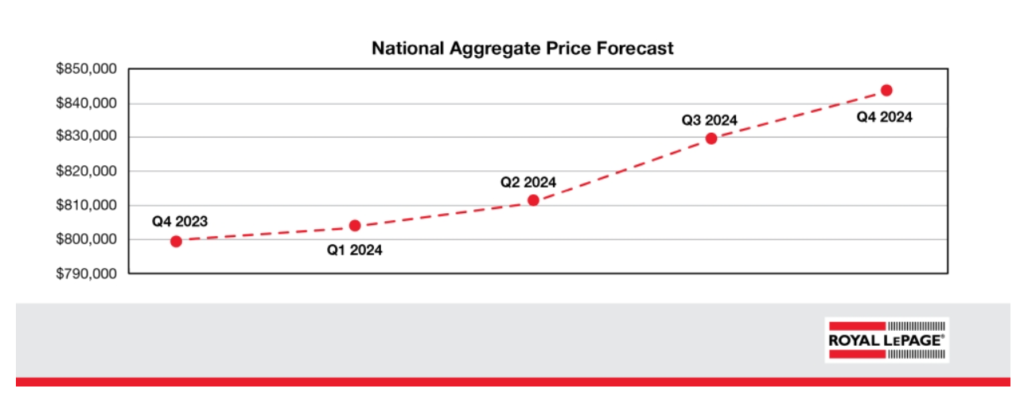
11 Jan The ‘great adjustment’: Canadians to adapt to new reality as housing market returns to near-normal in 2024
Royal LePage predicts minor interest rate cuts to fuel national aggregate home price increase of 5.5% year over year in fourth quarter of 2024
Highlights:
- Nationally, single-family detached and condominium prices forecasted to increase 6.0% and 5.0%, respectively, year over year in Q4 of 2024
- Home prices are expected to show greatest increases in second half of 2024
- Calgary aggregate home price projected to see greatest gains of all major markets at 8.0%
- Aggregate price of a home in the greater regions of Toronto and Montreal are forecast to end next year 6.0% and 5.0% respectively above the final quarter of 2023, while Greater Vancouver is expected to see a more modest increase of 3.0%
- Royal LePage forecast based on expectation that Bank of Canada will hold rates steady through first half of next year, and begin modestly easing rates in late summer or fall
After years of unprecedented irregularity, Canadians may see the real estate market return closer to normal in 2024. According to the Royal LePage Market Survey Forecast, the aggregate[1] price of a home in Canada is set to increase 5.5 per cent year over year to $843,684 in the fourth quarter of 2024, with the median price of a single-family detached property and condominium projected to increase 6.0 per cent and 5.0 to $879,164 and $616,140, respectively.[2]
“Looking ahead, we see 2024 as an important tipping point for the national economy as the majority of Canadians acknowledge that the ultra-low interest rate era is dead and gone,” said Phil Soper, President and CEO, Royal LePage. “We believe that the ‘great adjustment’ to tolerable, mid-single-digit borrowing costs will have a firm grip on our collective consciousness after only modest rate cuts by the Bank of Canada.”
Home prices are expected to rise next year in all major markets across the country, with Calgary forecast to see the greatest gains. Throughout the second half of 2023, while prices have been declining in other cities, the Calgary real estate market has bucked the trend continuing on an upward price trajectory.
Royal LePage’s forecast is based on the prediction that the Bank of Canada has concluded its interest rate hike campaign and that the key lending rate will hold steady at five per cent through the first half of 2024. The central bank is expected to start making modest cuts in late summer or fall of next year. Meanwhile, several major financial institutions have already begun offering discounts on fixed-rate mortgages.
“For the last year, many Canadians have been fixated on the idea of interest rates needing to come down significantly before they can afford to enter or re-enter the housing market. Acceptance that a mortgage rate of four to five per cent is the new normal should untether pent-up demand as first-time buyers, flush with savings collected during the extended down market in housing, regain the confidence to go home shopping. And, with the return of first-timer demand, we expect families who have put off upgrading their homes to begin to list their properties in much greater numbers,” continued Soper.
How we got here
Over the last eighteen months, sales activity in most of Canada’s major real estate markets has been on the decline, while inventory levels have gradually increased. While transactions are down as much as 20 or 30 per cent in some regions, home prices have only declined modestly during this time, due to a simultaneous drop in demand as buyer hopefuls continue to hold out for lower interest rates. Still, prices remain above 2022 levels.
“Canada’s real estate market has been on a roller coaster ride for the last four years. A global pandemic briefly brought market activity to a grinding halt in early 2020, followed by a rapid, widespread spike in demand and price appreciation as Canadians sought safety and greater living space in their homes among a world of uncertainty. By the spring of 2022, home prices had reached unprecedented highs, but when interest rates started rising quickly and steeply to combat inflation, the extended market correction began,” said Soper. “Markets take time to adjust. We see a move toward typical home sale transaction levels in 2024, and as the year progresses, appreciating house prices.”
Quarterly forecast
Nationally, home prices are forecast to see modest quarterly gains in the first two quarters of 2024, with more considerable increases expected in the second half of the year, following the anticipated start of interest rate cuts by the Bank of Canada. The aggregate price of a home in Canada is forecast to be 3.3 per cent higher in Q1 of 2024 compared to the same quarter in 2023, reflecting a 0.5 per cent increase over the fourth quarter of 2023. In the second quarter of next year, the national aggregate home price is forecast to be 0.2 per cent higher year over year and 0.9 per cent above the previous quarter. In the third quarter, home prices are expected to be 3.3 per cent higher year over year and 2.3 per cent higher on a quarterly basis. And, in the fourth quarter of 2024, the national aggregate price of a home is expected to land 5.5 per cent above the same quarter in 2023, an increase of 1.7 per cent quarter over quarter. Based on this forecast, by the end of next year, home prices will have essentially climbed back to their pandemic peak, reached in the first quarter of 2022.
 Supply shortage and affordability challenges
Supply shortage and affordability challenges
Canada continues to struggle with a chronic housing supply shortage. According to the Canada Mortgage and Housing Corporation, the country needs about 3.5 million additional housing units by 2030 to restore affordability, with the greatest need concentrated in the provinces of Ontario and British Columbia.[3] At the current pace of housing construction and considering the rate of new household formation and immigration projections, inventory will remain out of step with projected demand for years to come.
“For many years, condominiums have offered an affordable opportunity for entry onto the real estate ladder, in addition to their ‘lock and leave’ lifestyle that is typically attractive to young people. Of late, however, this segment of the market has also become out of financial reach for many in major cities like Toronto and Vancouver, where new construction cannot keep pace with growing demand. And, the elevated cost of construction materials and labour are adding additional pressure on builders,” said Soper. “What’s more, with ultra-low vacancy rates, the rental market is not the escape route many would-be buyers hope it could be, with monthly lease rates on the rise from coast to coast.”
This content piece is a redacted version of the Royal LePage Market Survey Forecast and is meant for information purposes only. The full article can be found at https://reganteam.ca/blog/
https://www.royallepage.ca/en/realestate/news/the-great-adjustment-canadians-to-adapt-to-new-reality-as-housing-market-returns-to-near-normal-in-2024/?fbclid=IwAR2ANWgaPWg86DEd7YLhVA7iJrFbW2qOOHvcXwUTHZIJy6VV1ZLofsaABqc
